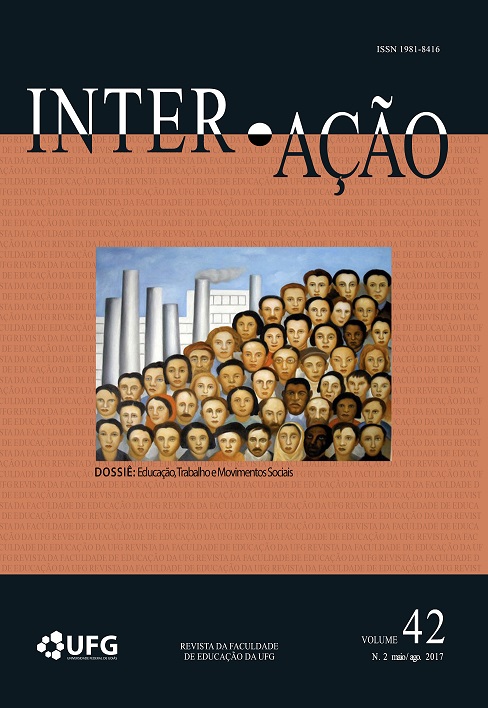TRABALHO, EDUCAÇÃO E MOVIMENTO SOCIAL: ANÁLISE SOBRE O SABER E A ATUAÇÃO POLÍTICA DOS PESCADORES AFILIADOS À COLÔNIA DE PESCADORES ARTESANAIS Z-16 DE CAMETÁ-PA
DOI:
https://doi.org/10.5216/ia.v42i2.46034Palavras-chave:
Saberes do Pescador. Trabalho e Educação. Colônia de Pescadores Z-16. Movimento Social.Resumo
Trabalho, Educação e Saberes dos pescadores da Colônia Z-16 de Cametá-Pa é produto de uma pesquisa que problematiza os saberes dos pescadores da Colônia Z-16 produzidos a partir do trabalho desses trabalhadores, buscando compreender como vem se dando a contribuição desses saberes quanto a fortalecê-los como sujeitos, assegurando a sobrevivência, ou negando o seu próprio trabalho. Na metodologia pautou-se na abordagem qualitativa, do tipo estudo de caso, tendo como referência o materialismo histórico-dialético. Os pescadores desenvolvem seus saberes a partir do seu trabalho. A atuação política dos pescadores contribui para desenvolver o saber no e para o trabalho enquanto práxis produtiva.Downloads
Publicado
Versões
- 2026-02-03 (2)
- 2017-12-07 (1)
Como Citar
Edição
Seção
Licença
Copyright (c) 2017 Revista Inter Ação

Este trabalho está licenciado sob uma licença Creative Commons Attribution-NonCommercial 4.0 International License.
A Inter-Ação utiliza como base para transferência de direitos a licença Creative Commons Attribution 4.0 para periódicos de acesso aberto (Open Archives Iniciative - OAI). Por acesso aberto entende-se a disponibilização gratuita na Internet, para que os usuários possam ler, baixar, copiar, distribuir, imprimir, pesquisar ou referenciar o texto integral dos documentos, processá-los para indexação, utilizá-los como dados de entrada de programas para softwares, ou usá-los para qualquer outro propósito legal, sem barreira financeira, legal ou técnica.
Autores que publicam neste periódico concordam com os seguintes termos:
1) Autores mantém os direitos autorais e concedem à revista o direito de primeira publicação, com o trabalho simultaneamente licenciado sob a Licença Creative Commons Attribution que permite o compartilhamento do trabalho com reconhecimento da autoria e publicação inicial nesta revista.
2) Autores têm autorização para assumir contratos adicionais separadamente, para distribuição não-exclusiva da versão do trabalho publicada nesta revista (ex.: publicar em repositório institucional ou como capítulo de livro), com reconhecimento de autoria e publicação inicial nesta revista.
3) Autores têm permissão e são estimulados a publicar e distribuir seu trabalho online (ex.: em repositórios institucionais ou na sua página pessoal) a qualquer ponto antes ou durante o processo editorial, já que isso pode gerar alterações produtivas, bem como aumentar o impacto e a citação do trabalho publicado.















